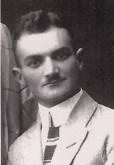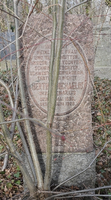
Das Leben eines Schuhverkäufers
-Max Michaelis und seine Familie -
Wie ist es möglich, Lebenswege nach zu zeichnen, die auf Archivfunden basieren?
Ein Versuch.
Geboren wird Max Michaelis im ausklingenden 19. Jahrhundert (08.11.1870) im pommerschen Dummerfitz, Kr. Neustettin als mittleres von wahrscheinlich drei Geschwistern
( Alexander Michaelis geb. 19.11.1869 und Rosa Michaelis geb. 22.04.1873).
Eine schöne, eine harte, eine aufreibende Kindheit?
Akten sind keine Tagebücher.
Er heiratet im März 1894 in Altbärbaum/Pommern Berta Michaelis geb. Michaelis (geb. 26.05.1871 in Pielburg).Diese Bindung schenkt der Welt vier Kinder, doch die Welt bedankt sich nicht. Nachdem der erste Sohn Arthur
(geb. 16.05.1895 in Altenwalde/Pommern) im Alter von 10 Jahren in Dummerfitz stirbt, verlässt zwei Jahre später Berta die Familie.
Bis dass der Tod sie scheidet (gest. 1907 in Pielburg).
Max heiratet erneut.
Die zwei Jahre jüngere Nanny Moses (geb. 1872 in Löbau/Westpreußen) wird nun Mutter von Martha, Gertrud und Hertha, nachdem sie 1909 den Bund in Berlin eingehen. Eine Patchworkfamilie für neun Jahre, dann stirbt Nanny in Berlin. Wieder auf sich gestellt.
Ob er kämpfen musste? Wie könnte er nicht.
Im Taumel des Weltkriegsendes zieht die vierköpfige Familie nach Kulmbach.
Er heiratet zum dritten Mal.
Die Krankenschwester Emma Selma Lump
(geb.01.01. 1881 in Wüstensachsen/Kr. Fulda) ist nun Mutter von drei Kindern. Max baut sich eine Existenz auf. Er betreibt ein Schuhwarengeschäft in Kulmbach und ein weiteres in München, wo sich die Familie 1936 ein neues Zuhause aufbaut. Der Keim des Nationalsozialismus ist zu diesem Zeitpunkt schon gesät und sprießt nun in Form von Repressalien, die zunächst nur bis an die Geschäftstür des Schuhladens gelangen.
Uniformierte SA-Kräfte fordern die Menschen auf, sich zu wehren und bei einem Juden keine neue Fußbekleidung zu erwerben.
Juden sind schlecht. Juden sind Dreck.
Er muss 1937 beide Geschäfte aufgeben.
Emma verdient durch Aufräumarbeiten in der Praxis ihres Vermieters Dr. Julius Elkan den Lebensunterhalt für die fünf Michaelis‘.
Leben. Wie schon? Aber leben.
Noch fünf Jahre. 1942. Theresienstadt.
Emma und Max. Am 3. Juni . Beide. Vielleicht ein Zug. Ein Abteil.
Dann der Abschied. Emma in Auschwitz. Wie lange?
Max in Theresienstadt. 60 Tage.
Dunkelheit.
Hertha, die inzwischen mit dem Konditor Julius Sommerfeld verheiratet ist, folgt ihrer Stiefmutter mit ihrem Gatten im November 1942.
Ein kurzes Atmen. Wolkenbruch. Frühling.
Martha, seit 1929 mit Paul Mucha verheiratet und in Iserlohn lebend, übersteht.
Sie übersteht die Haft im Polizeigefängnis Schwarzenbach i. Sa. und die Zwangs-arbeit in Hagen-Haspe.
Und Theresienstadt. Sie tanzt. Vielleicht. Irgendwo.
Und Gertrud auch. Emigration? Immer weiter. Sie heißt jetzt Belling. Seit wann und mit wem?
Aber sie heißt auch Michaelis.
Alles dreht sich weiter. Hier hin und dort hin.
The life of a shoe shop owner
- Max Michaelis and his family -
Is it possible to write about someone’s life and their family from archive information?
An attempt.
Max Michaelis is born in Dummerfitz, Pommerania, Germany on the 8th November 1870, which was the dusk of the 19th century. With a high probability he was the middle of three children (Alexander Michaelis born on the 19th of November and Rosa Michaelis, born on the 22nd of April 1873)
Who knows how his childhood was?
Was it fun? Was it exciting? Archives do not give us feelings. We can let our fantasy paint little pictures though.
Max married in March 1894 in Altbaerbaum, Pommerania, Germany. He married Berta, nee Michaelis. She was born on the 25th of May 1871, in Pielburg, Pommerania. Four children were borne from this marriage. Sadness came to the family as Arthur, the only son died at the age of 10. How does a father feel when his only son dies? Terrible, truly terrible. Two years later, more sadness, as Berta dies’. Until death us do part’, that is the old saying. The year is 1907, we are in Pielburg.
A man standing alone with 3 children.
Happiness though as Max marries again .A new family. Nanny Moses was two years younger (born in 1872 in Loebau, western Prussia).She is the new mother to Gertrud, Martha and Hertha.
Max and Nanny were married in 1909 in Berlin, a Jewish wedding. A ‘patchwork family’ for nine years. Were they happy years? Who knows? Then sadness once again as Nanny dies. Max and the girls alone, once again. What a hard life it must have been in the early years of the new century.
Max must have been a strong personality to have coped with these traumatic events. First his beloved son Arthur, then two beloved wives.
In the years around the First World War, the family moved to Kulmbach, upper Franconia in northern Bavaria. Max marries a third time. Was this going to be third time lucky? He marries Emma Lump, a nurse. Emma was born on the 1st of January 1881 in Wuestensachsen, Fulda. Emma is the third mother to the three girls, who are growing up fast.
The girls lives can not have been easy, first their brother, then their mother, then their stepmother. What emotions did they carry in their hearts? What were there feelings? Now a third mother, a friend, a big sister?
Max must have been strong; again we can only surmise how he was. He must have had a survival instinct. He builds up a business at Kressenstein 8 in Kulmbach.8 is a lucky number. Is it Max’s lucky number? (See link to MGF website to see a picture of the shop as it was, the Commerzbank is on the site today).
Max has a shop in Kulmbach and another in Munich a hardworking man, but in the eyes of society a JEW. Society did not like Jews of any kind. The year is 1936, and Hitler has been in power for just three years. Three years too long, but in power the Nazis are and Jews have no place in Nazi Germany. No place at all.
Life in Kulmbach became unbearable for Max and the family, so they moved to Munich. Not escaping the Nazis though. Life was hard .Germans at the time believed ‘Jews are bad; Jews are dirt’1937 came and Max had no businesses any more.
It was just four years since the Nazis came to power. Four long years.
Emma was now supporting the family by working in the practice of Dr Julius Elkan. She was now the bread winner. A life, but what must life have been like? We do not know, but we can imagine.
Five years have gone by and the year is 1942.The infamous Theresianstadt. Emma and Max on the 3rd of June, maybe on the same train, maybe the same carriage. Who knows? Then a goodbye, a sad goodbye. Tears in their eyes?
Emma in Auschwitz. How long, who knows? Max in Theresienstadt, 60 days and then darkness.
What of the girls? Hertha, who in the meantime had married pastry maker Julius Sommerfeld, followed stepmother and husband to Auschwitz in November 1942. Infamous names Theresienstadt and Auschwitz ,two of many infamous death camps in the German Reich.
One deep breath, downpour, springtime.
Martha who had been married to Paul Mucha since 1929 in Iserlohn survived. A ray of sunshine amongst all the darkness. She survived prison in Schwarzenbach and the slave labour at Hagen-Haspe and Theresianstadt. A miracle. What miracle? She survived and the family gone. Another deep breath. How did she feel? We do not have to imagine for too long, do we?
Then there was Gertrud, who knows maybe immigration. She is Gertrud Belling now, she is a Michaelis. The clock ticks and time moves on, through the years and decades to the present.
Written by Moritz Grote, great great grandson to Rosa and Simon Michaelis
(Freely translated by Bernard Michaelis)


